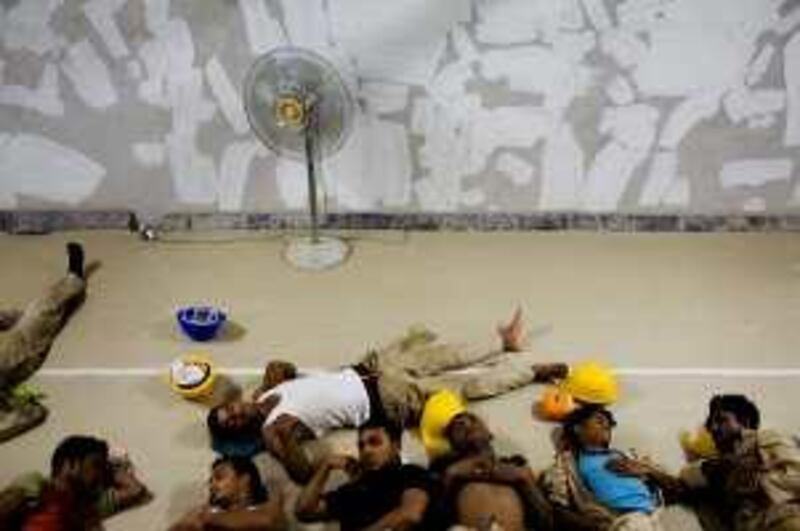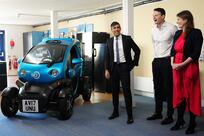Construction continued through the hottest hours of the day at several sites in Sharjah yesterday, despite the official start of the summer period in which companies must give their labourers a break.
Other sites appeared not to be providing workers with a cool rest area during the stipulated lunch hours, between 12.30pm and 3pm. Companies that flout the requirement, in force during July and August, face fines of up to Dh30,000 (US$8,200). With temperatures reaching 50°C and humidity as high as 78 per cent in some coastal areas, reporters from The National fanned out to sites across the country to find out if employers were abiding by the law.
All the sites visited in Abu Dhabi and Dubai had complied with the break requirement, although not all had provided adequate rest facilities. On those that had not, The National was unable to contact any representatives of the contractors involved. In Sharjah, a number of construction companies on Al Khan Road, Industrial area and Al Nahda continued work after 12:30pm. Again, no one from the contractors that were apparently breaking the law could be contacted for comment.
Some workers said they did not know the provision of rest hours was mandatory. Habib Mohammed said his boss had begun giving them a break in June, but the hours would vary. "Even today, we shall be going until after 1:30," he said. Some workers were also forced to take refuge under trees and bridges as employers failed to provide compulsory shaded, cooled rest areas or transport them back to their accommodation during the break.
Ausi Gul, who had sought shade under some trees, said: "We can't go to our accommodation in Ajman as the engineer wants us around at exactly 3.30pm, [but] the traffic doesn't allow us to come back on time." In Abu Dhabi, many companies were abiding by the break regulations, although some workers still struggled to find shaded areas to rest. On a site near Muroor Road and 15th Street, Mohammed Kekhia, a project manager with Amana, had allocated a rest space for its 230 workers, equipped with industrial fans. "We are giving them rest to increase productivity," he said. "Before this rule I noticed on other sites that there would be a lot of heat-related accidents with workers, but this way, it is more healthy for everybody."
At a site next to Al Wahda Mall almost 2,000 workers rested in the air-conditioned mezzanine areas of nearly completed buildings. On a neighbouring site, Ahmad Ayash, a project manager with Technical Square General Maintenance, had hired a minivan to transport his workers home for the break hours. "I am taking them personally because I don't want them to wait in this heat," he said as eight workers filed into his van. "We will be doing this till the end of August."
However, on the same kerb more than 40 men from another site had been waiting for transportation from their company for more than an hour. "The engineer told us an hour ago that the bus would be here but no one has come to pick us up," said Rajan Singh. "We have no choice. We have to wait in this heat to go back to our camps." Along Al Wasl road in Dubai, labourers had gathered under trees, with their shoes and shirts off, sleeping before having to return to work.
At the side of Sheikh Zayed Road, several men were resting under a tree near the hole they had been digging to lay cable. They said the break was a welcome relief, but said the temperature had become unbearable almost two months before. "The break is good, but it would be better to start in May or June - it has been hot and we usually only get 30 minutes or an hour for lunch," one said. More than 100 Ministry of Labour inspectors will visit sites across the country during the summer months to ensure employers are complying with the rules, and imposing fines where necessary.
Workers can report violations anonymously through the Ministry of Labour's 800665 hotline. Mohammed al Abri, the head of meteorology at NCMS, said the humidity had jumped over the past week as north-westerly winds brought water vapour inland. Temperatures had also been steadily increasing. "The problem in July and August is that high temperatures are combined with high humidity, which makes it feel even hotter," he said.
"It can make it difficult to breathe, especially for those who are asthmatic, and of course it is a problem for those working in direct sunlight." Dr Belal Hashim, from Lifeline Healthcare, said its clinic saw about 10 labourers a day with heat-related illnesses - 10 per cent of its patients. He expected that to rise to 15 per cent over the next two months. Dr Ahmed al Zarouni, director general of Kuwait Hospital in Sharjah, said that last summer it received between 15 to 20 labourers a day suffering from heat exhaustion because of companies that flouted the rules.
Last year officials said 99 per cent of companies were abiding by the regulations, compared with 75 per cent when the break was first introduced in 2005. Inspectors found 398 violations last year, a reduction from 617 in 2007. * Reporting by Suryatapa Bhattacharya, Yasin Kakande, Loveday Morris, Gregor McClenaghan and Nour Samaha






